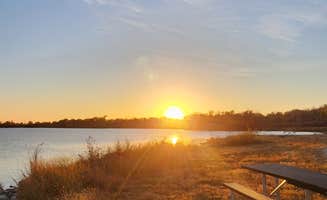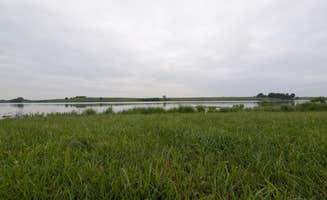Dispersed camping near Iola, Kansas centers around two state fishing lakes located in the southeastern plains of Kansas, where elevation averages around 980 feet above sea level. The area experiences hot, humid summers with temperatures often exceeding 90°F and cold winters that can drop below 20°F. Both Wilson and Woodson State Fishing Lakes require all visitors to purchase valid fishing permits regardless of whether fishing occurs during the overnight stay.
What to do
Fishing opportunities: Wilson State Fishing Lake offers year-round fishing for largemouth bass, channel catfish, and crappie. Jake S. reported, "Most of the spots on this lake are good in size and some have a nice open view of the sky for solar and Starlink which was great."
Stargazing sessions: The minimal light pollution at Woodson State Fishing Lake creates excellent conditions for night sky viewing, particularly during meteor showers from April through August. Kevin C. noted, "Went on a Wednesday and it was v quiet other than a couple other folks a ways away."
Birdwatching excursions: The wetland areas surrounding these fishing lakes attract migratory waterfowl during spring and fall seasons. Bring binoculars and field guides for optimal viewing opportunities of herons, egrets, and various duck species that frequent these waters.
What campers like
Solar power compatibility: The open areas at Wilson State Fishing Lake Dispersed provide excellent sun exposure for solar panel setups. One visitor mentioned, "Had between 5-10 cars drive by each day so barely any traffic," highlighting the quiet conditions preferred by many dispersed campers.
Water proximity: Campers appreciate the ability to set up tents near the shoreline at both fishing lakes. Kevin C. shared his experience at Woodson: "Was easy to find a quiet little spot along the water to set up my tent for the night."
Minimal oversight: The self-regulated nature of these fishing lakes allows for flexibility in campsite selection. John G. appreciated the spaciousness, stating, "Nice area plenty of room with our 5th wheel."
What you should know
Permit requirements: Kansas fishing licenses are required at both state fishing lakes, obtainable online or from local vendors in Iola. Daily permits cost $7.50 for residents and $14.50 for non-residents, with annual options available.
Supply planning: No potable water exists at either location, requiring campers to bring at least one gallon per person per day. The nearest supply point is in Iola, approximately 11 miles from Wilson and 13 miles from Woodson.
Weather preparedness: The open terrain offers limited natural wind protection, especially during spring storm season. Jake S. advised, "When I got here it was very windy and the spot directly across the lake from here ended up being better and a little more out of the wind since there were more trees."
Tips for camping with families
Safety considerations: The unfenced water access requires constant supervision of children at these rustic camping areas near Iola, Kansas. Life jackets are essential for any water activities.
Entertainment options: Pack board games, card decks, and nature identification books as no recreational facilities exist on-site. The simple setting encourages traditional camping activities like storytelling and stargazing.
Noise awareness: Sound carries across water, so maintain reasonable volume levels, particularly after sunset. The quiet environment at these locations allows for nature sounds to become part of the camping experience.
Tips from RVers
Leveling challenges: Bring leveling blocks as the terrain at these fishing lakes varies in flatness. The unpaved parking areas may require additional stabilization for larger rigs.
Tank management: With no dump stations available, RVers must practice strict water conservation. Plan for at least 25% less water usage than normal and locate dump stations in nearby towns before arrival.
Space assessment: While John G. mentioned having "plenty of room with our 5th wheel" at Wilson State Fishing Lake, larger units should consider arriving earlier in the day to secure suitable parking areas, especially during peak fishing seasons from April to October.



